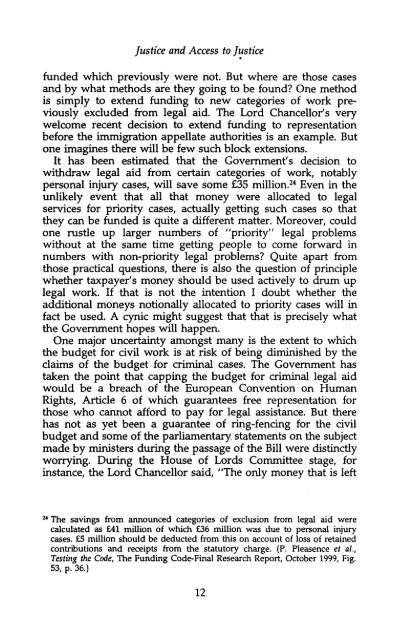HAMLYN - College of Social Sciences and International Studies ...
HAMLYN - College of Social Sciences and International Studies ...
HAMLYN - College of Social Sciences and International Studies ...
Create successful ePaper yourself
Turn your PDF publications into a flip-book with our unique Google optimized e-Paper software.
Justice <strong>and</strong> Access to Justice<br />
funded which previously were not. But where are those cases<br />
<strong>and</strong> by what methods are they going to be found? One method<br />
is simply to extend funding to new categories <strong>of</strong> work previously<br />
excluded from legal aid. The Lord Chancellor's very<br />
welcome recent decision to extend funding to representation<br />
before the immigration appellate authorities is an example. But<br />
one imagines there will be few such block extensions.<br />
It has been estimated that the Government's decision to<br />
withdraw legal aid from certain categories <strong>of</strong> work, notably<br />
personal injury cases, will save some £35 million. 24 Even in the<br />
unlikely event that all that money were allocated to legal<br />
services for priority cases, actually getting such cases so that<br />
they can be funded is quite a different matter. Moreover, could<br />
one rustle up larger numbers <strong>of</strong> "priority" legal problems<br />
without at the same time getting people to come forward in<br />
numbers with non-priority legal problems? Quite apart from<br />
those practical questions, there is also the question <strong>of</strong> principle<br />
whether taxpayer's money should be used actively to drum up<br />
legal work. If that is not the intention I doubt whether the<br />
additional moneys notionally allocated to priority cases will in<br />
fact be used. A cynic might suggest that that is precisely what<br />
the Government hopes will happen.<br />
One major uncertainty amongst many is the extent to which<br />
the budget for civil work is at risk <strong>of</strong> being diminished by the<br />
claims <strong>of</strong> the budget for criminal cases. The Government has<br />
taken the point that capping the budget for criminal legal aid<br />
would be a breach <strong>of</strong> the European Convention on Human<br />
Rights, Article 6 <strong>of</strong> which guarantees free representation for<br />
those who cannot afford to pay for legal assistance. But there<br />
has not as yet been a guarantee <strong>of</strong> ring-fencing for the civil<br />
budget <strong>and</strong> some <strong>of</strong> the parliamentary, statements on the subject<br />
made by ministers during the passage <strong>of</strong> the Bill were distinctly<br />
worrying. During the House <strong>of</strong> Lords Committee stage, for<br />
instance, the Lord Chancellor said, "The only money that is left<br />
24 The savings from announced categories <strong>of</strong> exclusion from legal aid were<br />
calculated as £41 million <strong>of</strong> which £36 million was due to personal injury<br />
cases. £5 million should be deducted from this on account <strong>of</strong> loss <strong>of</strong> retained<br />
contributions <strong>and</strong> receipts from the statutory charge. (P. Pleasence et al.,<br />
Testing the Code, The Funding Code-Final Research Report, October 1999, Fig.<br />
53, p. 36.)<br />
12

















